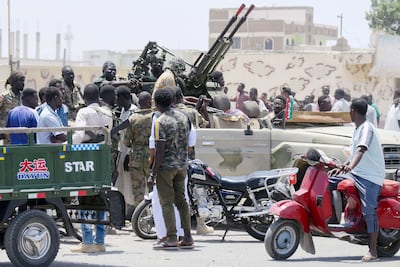In an exclusive interview with The National in September 2021, Sudan’s then foreign minister, Mariam Sadiq Al Mahdi, said the Sudanese people would not let anything derail the country’s transition to civilian rule after years of military control. Sudan, she said, had become “coup-proof”.
Events since have proved her statement to be premature. The fighting that has broken out over the past few days in Khartoum and several other cities between the Sudanese army and the Rapid Support Forces, a paramilitary organisation, threatens to deal a severe blow to the country’s already-precarious journey towards political stability.
That so many countries and international organisations immediately called for a ceasefire shows that Sudan’s friends and allies consider this a moment of true crisis. Whatever the proximate cause of the latest clashes, as former Sudanese prime minister Abdalla Hamdok noted on Sunday evening, “even the winner of this war is a loser.”
It is difficult to disagree with that sentiment, and the time is now for both sides to stop the slide into civil war. Sudan has endured numerous armed conflicts and coups since independence in 1956, and it is difficult to see what yet more violence can achieve for the country’s long-suffering people.

What the fighting does reveal is the intense difficulty of transforming a nation where the army has long been used to gain political power into one where a monopoly on the use of force lies strictly with a responsible and truly representative government.
Just over two weeks ago, The National reported that among the country’s most serious challenges was the issue of the RSF. With over 100,000 members in its ranks, it operates independently of the armed forces. How and when to bring this powerful group under civilian control was a sticking point in talks to ratify a political deal that would have relaunched Sudan's civilian-led democratic transition.
Many countries with a long history of conflict have also struggled with the thorny issue of incorporating armed factions into the state’s standing forces. Few of them have found a lasting solution to the problem. A 2018 paper published by the Carnegie Institute says that “efforts to reconstitute and rebuild state security institutions … require not just technical and organisational fixes, but hinge upon a range of sweeping steps and reforms with generational scope”.
Sudan’s people do not have the luxury of waiting for generational change — it is a country with profound economic, political and environmental challenges that require action now. This is a dangerous moment not only for the Sudanese people — who have more than enough to contend with — but for neighbouring countries with problems of their own.
However, there is time to step back from the brink. Sudan’s political dialogue may be a protracted and often frustrating process, but it has continued despite many setbacks, showing that there remains the will to find solutions. As Mr Hamdok said on Sunday: “I’m still optimistic, I’m a born optimist. No matter how grim things seem there’s still a chance for sitting down and resolving issues.”
It is particularly painful that the latest round of fighting has broken out in Sudan as the country approaches Eid — traditionally a time of celebration. But all is not yet lost. If those in positions of responsibility can put their loyalty to the country and its people first, then there is a chance to stop and draw breath.
The way to make Sudan truly coup-proof is a coalition government that is representative and accountable. This is the starting point for a new era for Sudan — rather than an era of renewed fighting that could be detrimental for all.


